$$$$.....Regular Fuel makes a real difference.
#46
Lexus Fanatic
Originally Posted by mmarshall
Can't say for sure, but one thing that may (?) have been a factor with your ES was that the 5Gen version had some problems with the engine/transmission ECU programming that delayed and/or messed up throttle and transmission response when accelerating from low speeds. That probably would have happened no matter what grade of gas you were using. A factory re-flash was supposed to help it, but, from what I understand, only had limited effectiveness.
I think the difference is simply because the 3.5 in the GS and IS is higher performance, direct injection, etc.
#47
Lexus Fanatic
#48
Lexus Fanatic
In a word......Yes, according to Consumer Reports.
I've always had a high opinion of the detergent additives used in Chevron and Shell-brand gas......and this study verifies it, though it is also generally supportive of most of the major name brand fuels. years ago, Mobil, years ago, used to have the strongest detergent additives, but once they got bought out by Exxon (a company, BTW, that, at the time, I did not think very highly of), some the bets might (?) have been off....though they are still on the recommended list here.
The main issue, though (as I've stated for years in my CL posts) is not to use cheap cut-rate brands that may save a few cents per gallon now, for the price of gummed-up engines and injectors later. Then you have to use a good fuel-system-cleaner (or pay for a de-carbonization service) that defeats the very purpose of using cheaper fuel to start with. So, it's like old Fram oil filter commercials (some of you old-timers, like me, might still remember them) that said "You can pay me now, or pay me later" (comparing Fram filters, of course, to cheap cut-rate ones).
For those of you in the D.C./Baltimore areas (or anywhere Giant Food grocery stores are located), Giant will give you a 10-cent discount per gallon off Shell gas for every 100 points on your plastic Bonus-card (normally 1 point per dollar spent, unless marked otherwise)...so, not surprisingly, I do a fair amount of shopping there.
http://www.consumerreports.org/car-m...h-extra-price/
By Jeff S. Bartlett
Last updated: August 22, 2016Location and price drive gasoline sales, according to a new survey by the American Automobile Association. But an extensive study also conducted by AAA, reveals that consumers would be wise to factor the quality of the gasoline in their purchase decision.
Using an independent engine testing lab that specializes in fuel analysis, AAA sought to answer the question: Is “Top Tier” gasoline worth the price? The short answer is yes.
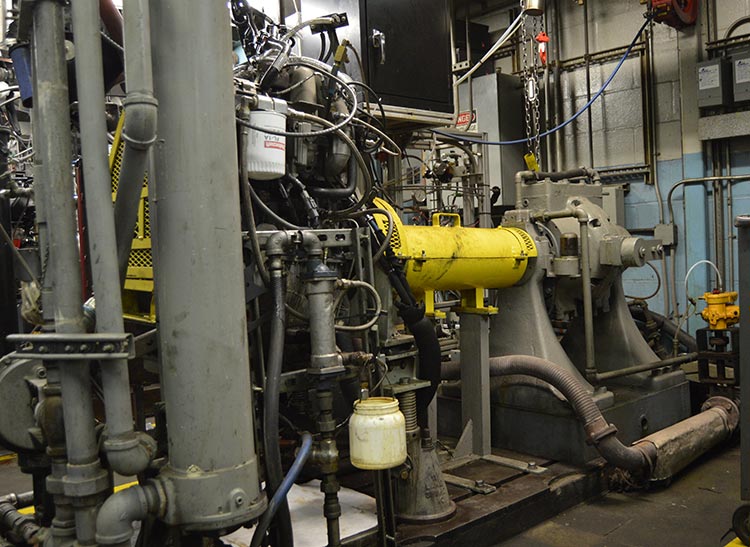
Ford 2.3-liter engine tested on a dynamometer.
PHOTO: AAA
Top Tier gasoline was developed in 2004 to go beyond the minimum standard for detergent additives to better protect increasingly sophisticated engines from carbon buildup and deposits on the intake valves—which can result in a rough idle, acceleration hesitation, knocking/pinging, and reduced fuel economy.
Over the past 20 years, engines have become far more precise, operating under tighter tolerances and at higher compression ratios, while targeting cleaner emissions and improved fuel economy. To achieve these goals, eight automakers—Audi, BMW, Fiat Chrysler Automobiles, General Motors, Honda, Mercedes-Benz, Toyota, and Volkswagen—have united in support of Top Tier gas, specifically recommending it to their owners with the goal of preserving their engines’ original performance and emissions over time.
Top Tier retailers include 76, Aloha Petroleum, Amoco, ARCO, Beacon, BP, Break Time, Cenex, Chevron, CITGO, Conoco, Co-op, Costco, CountryMark, Diamond Shamrock, Entec, Esso, Express, Exxon, Holiday, Kwik Star Stores, Kwik Trip, Mahalo, MFA, Mobil, Ohana Fuels, Petro-Canada, Phillips 66, PUMA, QT, Quik Trip, Road Ranger, Shamrock, Shell / Shell V-Power, Sinclair Standard, SuperAmerica, SuperFuels, Tempo, Texaco, Tri-Par, and Valero.
Visit our guide to fuel economy.
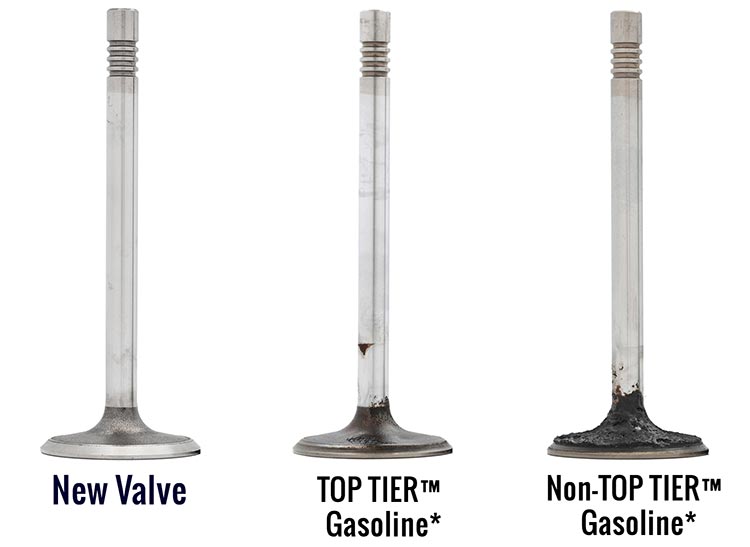
Intake valve comparison showing a new valve compared to the results from the 100-hour engine test.
PHOTO: AAA
The results showed that on average, Top Tier gasoline had 19 times fewer carbon deposits on injectors, intake valves, and in the combustion chamber when compared to regular gasoline.
AAA also found Top Tier gasoline can have a cleansing effect, reducing intake valve deposits by 45 to 72 percent when used over a 5,000-mile interval. Variation in the results is attributed to the detergents used by different brands.
Further, analyzing gas prices over a 12-month period found just a three cent price difference between non-Top Tier and Top Tier gasoline.
Bottom line: For the nominal investment, this study shows that motorists would benefit from using Top Tier gasoline as their primary fuel.
Given the technological trend toward more sophisticated engines, we think the EPA should consider raising the minimum detergent standards to ensure all drivers benefit from the type of performance and longevity promised by Top Tier fuels.
I've always had a high opinion of the detergent additives used in Chevron and Shell-brand gas......and this study verifies it, though it is also generally supportive of most of the major name brand fuels. years ago, Mobil, years ago, used to have the strongest detergent additives, but once they got bought out by Exxon (a company, BTW, that, at the time, I did not think very highly of), some the bets might (?) have been off....though they are still on the recommended list here.
The main issue, though (as I've stated for years in my CL posts) is not to use cheap cut-rate brands that may save a few cents per gallon now, for the price of gummed-up engines and injectors later. Then you have to use a good fuel-system-cleaner (or pay for a de-carbonization service) that defeats the very purpose of using cheaper fuel to start with. So, it's like old Fram oil filter commercials (some of you old-timers, like me, might still remember them) that said "You can pay me now, or pay me later" (comparing Fram filters, of course, to cheap cut-rate ones).
For those of you in the D.C./Baltimore areas (or anywhere Giant Food grocery stores are located), Giant will give you a 10-cent discount per gallon off Shell gas for every 100 points on your plastic Bonus-card (normally 1 point per dollar spent, unless marked otherwise)...so, not surprisingly, I do a fair amount of shopping there.
http://www.consumerreports.org/car-m...h-extra-price/
Study Shows Top Tier Gasoline Worth the Extra Price
AAA analysis reveals that gas with detergent additives can keep an engine running smoothly
By Jeff S. Bartlett
Last updated: August 22, 2016Location and price drive gasoline sales, according to a new survey by the American Automobile Association. But an extensive study also conducted by AAA, reveals that consumers would be wise to factor the quality of the gasoline in their purchase decision.
Using an independent engine testing lab that specializes in fuel analysis, AAA sought to answer the question: Is “Top Tier” gasoline worth the price? The short answer is yes.

Ford 2.3-liter engine tested on a dynamometer.
PHOTO: AAA
What Is Top Tier Gas?
Gasoline is essentially a shared commodity, often stored in common containers until it is purchased by a major retailer. After that, the retailer treats the gas with a specific additive, thereby giving the fuel its brand identity. But are these additives just a dosage of marketing hype?Top Tier gasoline was developed in 2004 to go beyond the minimum standard for detergent additives to better protect increasingly sophisticated engines from carbon buildup and deposits on the intake valves—which can result in a rough idle, acceleration hesitation, knocking/pinging, and reduced fuel economy.
Over the past 20 years, engines have become far more precise, operating under tighter tolerances and at higher compression ratios, while targeting cleaner emissions and improved fuel economy. To achieve these goals, eight automakers—Audi, BMW, Fiat Chrysler Automobiles, General Motors, Honda, Mercedes-Benz, Toyota, and Volkswagen—have united in support of Top Tier gas, specifically recommending it to their owners with the goal of preserving their engines’ original performance and emissions over time.
Top Tier retailers include 76, Aloha Petroleum, Amoco, ARCO, Beacon, BP, Break Time, Cenex, Chevron, CITGO, Conoco, Co-op, Costco, CountryMark, Diamond Shamrock, Entec, Esso, Express, Exxon, Holiday, Kwik Star Stores, Kwik Trip, Mahalo, MFA, Mobil, Ohana Fuels, Petro-Canada, Phillips 66, PUMA, QT, Quik Trip, Road Ranger, Shamrock, Shell / Shell V-Power, Sinclair Standard, SuperAmerica, SuperFuels, Tempo, Texaco, Tri-Par, and Valero.
Visit our guide to fuel economy.

Intake valve comparison showing a new valve compared to the results from the 100-hour engine test.
PHOTO: AAA
Gas Test Findings
For its test, the lab operated an engine continuously for 100 hours on a cycle to represent 4,000 real-miles of use. The engine was then disassembled, photographed, and its key components weighed and measured to determine the thickness of carbon deposits. Six fuels were used, randomly selected and split among three basic gasoline sources and three Top Tier.The results showed that on average, Top Tier gasoline had 19 times fewer carbon deposits on injectors, intake valves, and in the combustion chamber when compared to regular gasoline.
AAA also found Top Tier gasoline can have a cleansing effect, reducing intake valve deposits by 45 to 72 percent when used over a 5,000-mile interval. Variation in the results is attributed to the detergents used by different brands.
Further, analyzing gas prices over a 12-month period found just a three cent price difference between non-Top Tier and Top Tier gasoline.
Bottom line: For the nominal investment, this study shows that motorists would benefit from using Top Tier gasoline as their primary fuel.
Given the technological trend toward more sophisticated engines, we think the EPA should consider raising the minimum detergent standards to ensure all drivers benefit from the type of performance and longevity promised by Top Tier fuels.
Last edited by mmarshall; 07-03-17 at 06:34 PM.
#50
Lexus Fanatic
Agreed on the Techroline (Techron)....arguably the best detergent package on the market. Chevron, though, pulled out of the area where I live (Northern Virginia / D.C. suburbs), for reasons which are unclear (?).....and most of their former stations converted to a cut-rate brand called Liberty....a brand I scrupulously avoid. So, in this area, Shell's V-Power is probably the best current alternative.
Last edited by mmarshall; 07-03-17 at 07:12 PM.
#52
Lexus Fanatic
Yes and no, depending on the specific DI engines and design. Here's a good article on the subject:
http://www.autoguide.com/auto-news/2...-engines-.html
Is Carbon Buildup a Problem With Direct-Injection Engines?
By Craig Cole Jan 16, 201536

Direct injection offers numerous benefits over port fuel delivery but could it be a bigger headache than it’s worth?
The automotive industry has gradually switched to direct injection over the past decade or so and for good reason. Spraying a precisely controlled amount of fuel right into an engine’s combustion chambers can result in improved efficiency and greater power density; tailpipe emissions are generally cleaner as well.
In spite of these advantages, this technology isn’t perfect. DI has a handful of downsides including additional noise, particularly at idle and dramatically higher costs, though there are other concerns.
And a big one has to do with carbon deposits. We’ve heard rumblings that blackened buildup on the backsides of intake valves is a major problem and something that could be disastrous for motorists in the coming years. To get to the bottom of this potential top-end issue we did some digging.
What’s Really Going On?
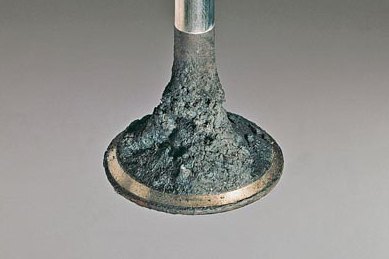 Ford has been pushing its EcoBoost engines as a way of improving fuel economy without sacrificing performance. The real-world results of this strategy may be mixed, but one thing is not: all of these powerplants feature direct injection as well as turbochargers and advanced control software.
Ford has been pushing its EcoBoost engines as a way of improving fuel economy without sacrificing performance. The real-world results of this strategy may be mixed, but one thing is not: all of these powerplants feature direct injection as well as turbochargers and advanced control software.These engines have been on the market for a number of years now and to get some empirical evidence from the front lines about how they’re holding up we reached out to Brian Laskowski, a Ford Factory Certified Technician. He also has a YouTube channel, FordTechMakuloco that highlights all sorts of automotive repairs.
Responding via e-mail Laskowski said, “Carbon deposits in Ford engines are not a widespread issue due to the advanced engine technology.” But he also mentioned that it has happened in some low-mileage EcoBoost units.
SEE ALSO: What is Top-Tier Gasoline?
“As of today the issue seems to be isolated to certain markets with varying factors such as fuel quality,” said Laskowski. If carbon buildup becomes severe he said it can result in all kinds of issues from drivability woes to misfires, turbocharger issues and even catalytic converter damage.
Survey Says…
Assuaging potential sky-is-falling fears, Michael Karesh, the developer of TrueDelta.com said carbon buildup is “not an issue for all direct-injected engines” based on the data he collects. His website surveys the owners of around 33,000 different vehicles to acquire relevant and timely data about vehicle reliability and fuel economy among other things.But of course there are some instances of deposit-related issues that have popped up. Karesh said, “The only engines it’s reported quite a bit is [with] the VW/Audi 2.0T and then the Audi V6s.” He also said, “I know there are some BMWs that end up with carbon buildup as well.”
As for the frequency of reported problems with these Volkswagen cars he said his numbers indicate “it can be as high as one in six over the last two years,” which “is a high number” and one that he said is consistent across different models.
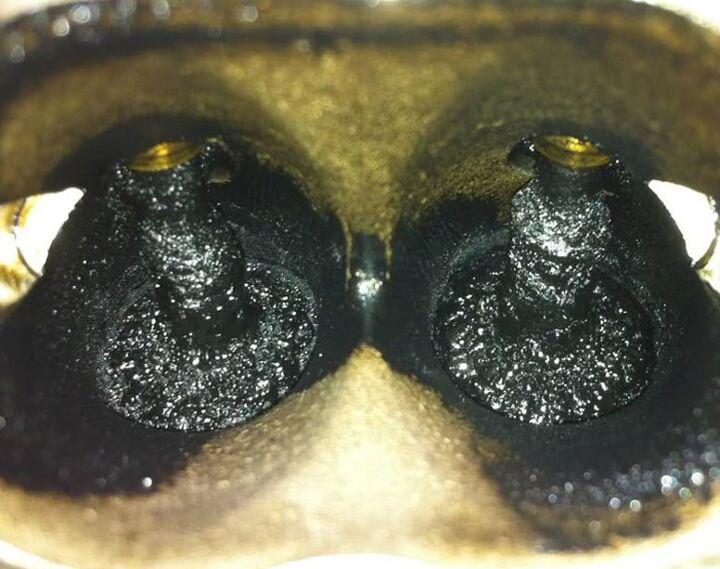
The 2008 Audi A3, which offered a 2.0-liter turbocharged four-cylinder engine, also popped up in the TrueDelta data. Karesh said it’s puzzling why 2006 and 2007 models aren’t having similar carbon issues. Leaving us with more questions he said, “I’m not really seeing GTIs [popup],” which are mechanically similar to the A3.
“If there is a non-German car there might be something happening in the [Cadillac] CTS,” said Karesh, but once again he cautioned that it’s “too scattered and sporadic” to draw any definitive conclusions. Additionally he said, “I have one report of decarbonizing the engine in a Chevrolet Equinox.” Unlike the other instances, he has quite a large sample size for this particular vehicle, which clearly indicates that deposits are not a major problem at this time.
The Whys and the Hows
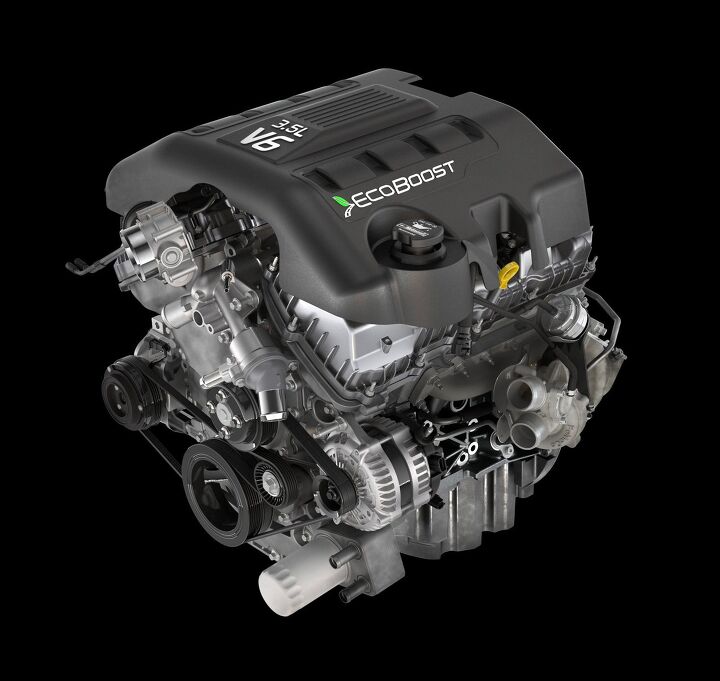 But how does this buildup occur?
But how does this buildup occur?“One of the biggest problems with direct injection is that the fuel is no longer being sprayed onto the backside of the intake valves,” Laskowski said.
This mist of gasoline actually helps keep the intake ports clean. In addition to fuel quality, he said things like valve and injection timing are key factors in carbon buildup.
Additionally software plays a huge role. “What I think is most overlooked is the PCM calibration itself,” the engine-control computer.
“I believe it’s the absolute key to preventing the bulk of this buildup by making the air and fuel burn as completely and cleanly as possible.” Laskowski also said a simple software update can yield dramatic results.
But if something does go awry with your EcoBoost engine and there are drivability issues associated with deposits, Laskowski said the only Ford-approved course of action at this time is to replace the cylinder head, though he also said, “Manual cleaning with a brush and various carbon dissolving products has been used with great success on vehicles out of warranty.”
Beyond outright replacement or lots of elbow-grease there are other ways of of dealing with carbon buildup. Laskowski said there’s a media-blasting technique that can clean engine intact tracts but the method is currently not approved by Ford. Regrettably he said, “In any case the service to remove the carbon can be time consuming and expensive.”
Down the Road
As for the long-term reliability of engines with direct injection, only time will tell if carbon buildup is a serious issue. But for the most part it seems like an isolated problem, at least at this time.When asked if he’d hesitate to purchase a vehicle with DI because of this issue Karesh said no. “I’m not seeing it for anything after 2010 or so.”
SEE ALSO: What is Octane?
“I think even though direct-injection technology is far superior today compared to a decade ago that with varying fuel qualities, different driving techniques and overall aging of the engines it will be an issue for some,” Laskowski said. Going on he said Ford should develop a cleaning process for EcoBoost powerplants so carbon can be addressed without completely tearing engines down.
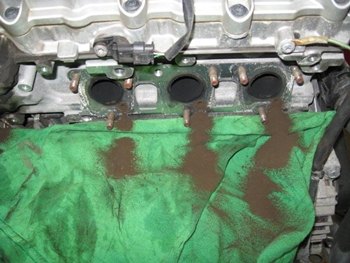 Conventional induction-cleaning services aren’t recommended with Ford’s EcoBoost engines. Laskowski said turbochargers can be damaged and they ain’t cheap to replace. “Again I believe the bulk of this problem can and will be eliminated with future PCM software-calibration updates.”
Conventional induction-cleaning services aren’t recommended with Ford’s EcoBoost engines. Laskowski said turbochargers can be damaged and they ain’t cheap to replace. “Again I believe the bulk of this problem can and will be eliminated with future PCM software-calibration updates.”For the time being Karesh said that according to his data, “Clearly it’s a VW/Audi problem and not much else.” Elaborating he also said, “We’ve got other direct-injected engines and it’s not showing up for those.”
Since carbon-related issues with direct injection seem to be sporadic at best Karesh said this is good news for drivers. “It means you don’t have to plan on decarboninzing your engine every two years for $800 a pop.” When asked if deposits could become a nightmarish issue in the future he said, “I can’t say. I don’t have my crystal ball; it’s in the shop,” and hopefully not because of something related to carbon.
#55
#56
Pole Position
but yes, not having the fuel wash over the valves in DI engines leaves the valves relatively unaffected with regard to carbon buildup. ideally, direct and port-injected engines would be more commonplace.
as an aside, i only use chevron and throw in some techron additive every few months.
#58
Lexus Fanatic
Though I don't feel there's any benefit, since 2 of our cars need premium, we go to Costco. Why, because depending on the location, it's either 20, or 25 cents more for premium, whereas other places premium is a lot more than regular. They just so happen to be top tier.
#59
Pole Position
Exactly, but people are stubborn, on forums, people even use Techron in DI motors claiming there are other benefits, such as their skin was smoother, people listened to their ideas more often, they felt more rested in the mornings, and short-term memory improved.
Though I don't feel there's any benefit, since 2 of our cars need premium, we go to Costco. Why, because depending on the location, it's either 20, or 25 cents more for premium, whereas other places premium is a lot more than regular. They just so happen to be top tier.
Though I don't feel there's any benefit, since 2 of our cars need premium, we go to Costco. Why, because depending on the location, it's either 20, or 25 cents more for premium, whereas other places premium is a lot more than regular. They just so happen to be top tier.
#60
Exactly, but people are stubborn, on forums, people even use Techron in DI motors claiming there are other benefits, such as their skin was smoother, people listened to their ideas more often, they felt more rested in the mornings, and short-term memory improved.
Though I don't feel there's any benefit, since 2 of our cars need premium, we go to Costco. Why, because depending on the location, it's either 20, or 25 cents more for premium, whereas other places premium is a lot more than regular. They just so happen to be top tier.
Though I don't feel there's any benefit, since 2 of our cars need premium, we go to Costco. Why, because depending on the location, it's either 20, or 25 cents more for premium, whereas other places premium is a lot more than regular. They just so happen to be top tier.

